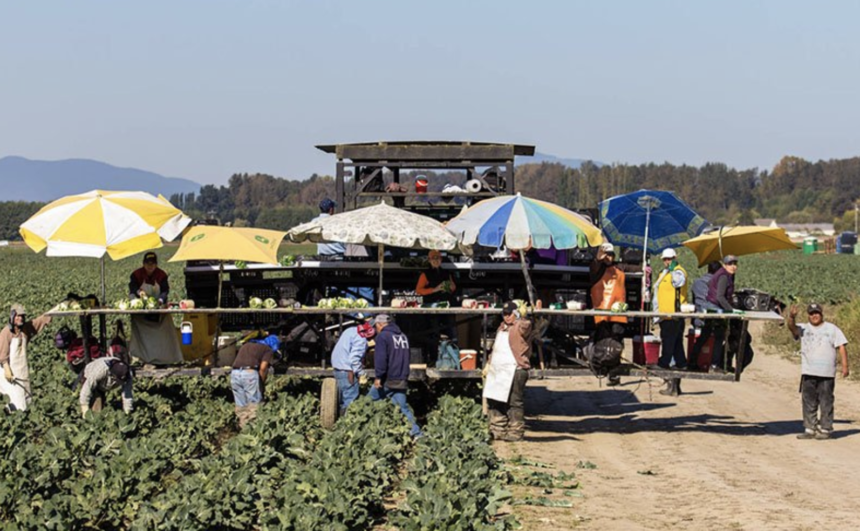Migrant workers faced dangerous conditions even before COVID-19

WASHINGTON – Migrant farmworkers are in “serious danger” of contracting coronavirus because of ongoing poor conditions like overcrowded housing, buses and lack of access to healthcare, according to a new report.
The report by the Centro de los Derechos del Migrante group surveyed 100 migrant workers from Mexico with temporary H-2A visas from September 2019 to January 2020, before the spike on coronavirus cases across the U.S.
“The findings of this report would be deeply troubling in more ordinary times and these are not ordinary times,” said Mary Bauer, lead counsel for the center in a conference call Wednesday.
The report – “Ripe for Reform: Abuses of Agricultural Workers in the H-2A Visa Program – said those workers routinely face discrimination and harassment while working for up to a dozen hours a day without breaks. The report details legal violations alleged by all 100 migrant workers that were questioned.
One industry representative accused the report’s authors of “cherry picking,” saying the findings do “not jibe at all with my experience.”
“I’m not saying those things never happen, I’m sure there are bad apples in every industry and I’m sure some of those things have happened in isolated incidents,” said Jason Resnick, vice president and general counsel for the Western Growers Association. “But to say that 100% of H-2A employees have suffered a violation of the H-2A regulations or labor laws is ludicrous.”
Emma Torres, the executive director of the Campesinos Sin Fronteras, or Farmworkers Without Borders, said that while growers in Arizona generally live by the rules, those rules still leave workers in crowded conditions and uninformed about safety in the face of the virus.
“I cannot speak for every one of the farmers and employers,” Torres said. “With anything and any industry there are good employers and there are bad employers, some that will enforce the regulations to the maximum level and others that may not as much.”
The survey said workers reported sleeping in illegally crowded rooms with up to five people for two beds, and traveling in buses that were overcrowded, increasing the risk of coronavirus spread and making quarantine impossible.
Bauer said the H-2A program for foreign agricultural workers “in many ways creates a perfect storm of vulnerability during this pandemic for workers who put food on our tables.”
“They don’t have regular opportunities to take breaks and wash hands during the day. They don’t have the economic power to stay home from work if they have symptoms,” she said.
Torres said she hasn’t heard of any farmworkers in Arizona getting sick, but she knows that some fear going to the doctor in the U.S., even though employers are responsible to take them to the doctor or hospital if they get sick or hurt.
“A lot of the workers, especially those that live across the border, won?\’t ask them (employers) to take them to the doctor,” Torres said. “They will wait until they can be across the border and go to Mexico to go to the doctors because they may not have insurance.”
As a result, she said some workers may continue to work if they are not sick enough to go to the doctor or hospital.
The report features one worker who said he was injured while working on an H-2A visa in Arizona. Luis Lopez Alcala fell into a hole in 2016 and his employer refused to hire him back after Alcala went into debt following surgery for his injuries.
“All I wanted was to stay on good terms so as not to lose my job,” Alcala said in the report. “But it was the opposite…. They told me that I was no longer needed. They were hiring new people.”
Torres said that, at least in Arizona, housing for farmworkers is highly regulated by the state to make sure it meets guidelines set by the H-2A law, and Resnick said the Western Growers Association is working to help their members keep workers safe.
He said growers are staggering start times, limiting numbers of workers allowed on buses, requiring workers to maintain social distancing and sanitizing vehicles and surfaces, among other measures.
“Agricultural employers in particular are putting forward significant time and energy to prevent the spread of the virus,” Resnick said. “It starts with associations like Western Growers providing all of the resources that we can marshal for our members … and then letting them take the resources directly to the employees.”
Torres did say, however, that farmworkers in Arizona aren’t being educated about the risks of coronavirus and are only learning about it from the news.
“We have a community radio station that we have been using to continuously educate the population because we know that they are not getting the right information,” Torres said. “They are relying a lot on the news and Facebook.”
But Resnick said none of the allegations track with his experience in the field and he cautioned that the report should be taken with a grain of salt.
“There is a lot of negative press that is being put out by labor advocates that are using the coronavirus threat as an opportunity to fundraise and the reality is that employers are going as far as they possibly can to maintain a safe workplace,” Resnick said. “It’s not in anyone’s interest to let anyone get sick. We’re all in this together.”